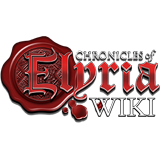Elyrian guilds function as player created, profit oriented organizations of professional craftsmen and merchants, bringing together individual or familiy businesses with the objective to enhance the competitveness of its individual members through cooperation. Reminiscent of their 14th century European medieval and Renaissance antecedents, guilds in Chronicles of Elyria act as professional societies and unions specializing in a specific craft. Guilds fulfil a wide range of activities that may include facilitating contracts of trade, development of new technologies pertaining to the craft on a broader scale than can be achieved through individual efforts alone.
Advantages in Guild Membership
Having a membership in a guild increases a player's access to resources as well as provides a steady stream of customers who trust the brand name established by your guild (assuming the guild has matured enough for this). As a guild's reputation and fame increases, so will members' revenues. [1]
Disadvantages in Guild Membership
Players who are a part of a guild and sell their items with the guild logo/representation may have a percentage of their earnings go back to the guild if that is a requirement of membership.[1] [2]
Guild Structure
Guild organization structure is similar to businesses on Earth, there are employees or members who earn money for the guild and the owners of the guild. Most guilds allow members to keep a percentage of profits earned while keeping the rest to either go to the owners of the guild or to guild costs. Unlike schools, the more successful a guild is, the more it focuses on expanding its operations to a larger scale with multiple locations scattered throughout the kingdom they reside in. Members are restricted to one type of guild/organization at one time, so a player could be a part of a Tanning Guild and a Smithing Guild (or a Smithing Guild and a School) but not two different Tanning Guilds.[1]
Funding
Most funding is from its members, guilds rarely receive money from government and, most of the time, pay income tax for money they make.[1]
Research benefits
Ref.:[2]
In Chronicles of Elyria, once a player masters the production/craft of a specific item, they are presented with the option to add a certain amount of risk while producing the product in order to research a specific problem pertaining to the product. This risk may include the loss of materials, failure of production, injury, and in rare cases, even death.
However, guilds provide a way to mitigate the costs and risks of research as research done under the jurisdiction of a guild aggregates the combined efforts of both the player and all other players part of the guild that are researching the same question. Thus, the coordination of efforts allows for a higher probability of a return on the investments.
Guild-like organizations
Guilds in other MMORPGs have been considered the "catch-all" institution for organizing and coordinating large amounts of players. These early forms of guilds often included a multitude of specializations, classes, and crafts, thereby creating a micro-kingdom in its own right. However, Soulbound Studios has altered the paradigm of "the Guild system" to move away from the previous self-sufficiency format to one more typical of our real-world understanding of guilds.
Families
Soulbound Studios has often likened families to what players may traditionally consider a guild. Families in Chronicles of Elyria serve as a community of players and npc's related by in-game birth that exchange resources, information, and technology.
Schools
Schools are similar to guilds in the sense that they are associations of craftsmen. However, the main object of schools is for the advancement of research. This does not imply there can be no relationship between schools and guilds.
- See also Organizations
Restrictions
Players can only be in one guild per crafting skill unless they disguise themselves to join multiple guilds.
Trivia
Patents were initially planned as a means for Guilds to protect their specific knowledge but discarded later. As mentioned in Discord #coe-common-room on 10 December 2016, patents were removed from the scope of the game as to allow others to independently acquire the same ability to create something through independent research.[citation needed]
